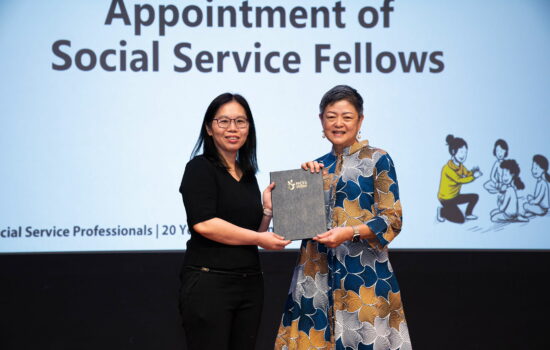When a serious illness strikes, it can be extremely trying for our loved ones to make difficult decisions for us. One way to lighten their burden in such challenging times is to begin our care planning early. By thinking of our wishes and preferences in advance, and communicating them with our loved ones, it can help to guide them in decision-making should a crisis happen. We speak to Mr Wang Yi, caregiver and husband of Ms Zou Wentao, a client from SPD Sheltered Workshop and Specialised Case Management Programme (SCMP) as he walks us through his care planning journey.
A brain injury that occurred during childbirth about seven years ago affected Ms Zou’s cognitive functioning. Since then, she has to rely on her husband, 35-year-old Mr Wang Yi, to make decisions for her.
As she did not make a Lasting Power of Attorney (LPA) prior to her accident, Mr Wang had to apply for a deputyship order in court to settle matters for her.
An LPA is a legal document which allows a person who is at least 21 years old (donor), to appoint one or more persons (donee(s)) to make decisions and act on his behalf should he loses mental capacity. A donee can be appointed to act in the areas of personal welfare, as well as property and affairs.
In contrast, a deputyship order is where a person (a “Deputy”) is appointed by court to manage the personal welfare or the property and affairs of another person, who lacks the mental capacity to manage these for themselves. A Deputy can only act under a court order from the Court of Protection.
Mr Wang recalled the lengthy process he underwent to sort out matters for his wife: “My wife’s bank account was “locked”, and I had to apply to become her deputy to “unlock” it. For that, I needed to get a medical report from the doctor, her parent’s consent, and other supporting documents. There are also legal documents to sign – all of which are very foreign to me. I had to engage a lawyer to help me.”
When he wanted to sell their HDB flat and buy a new one, he remembered having to apply to the court for permission too.
To juggle these processes while working and caring for his wife and daughter took a toll on Mr Wang: “I was at times very frustrated. Laws protect individuals but overlook the family.”
To help our loved ones better manage our affairs should we lose mental capacity one day, SPD’s lead social worker Gina Tan encourages all to consider making an advance care plan.
What is Advance Care Planning?
Advance Care Planning (ACP) is the process of planning for your current and future healthcare and personal care. It involves a series of discussions with your loved ones and healthcare team so that they know how you would like to be cared for, should you become unable to make decisions for yourself.
In the process of doing your ACP, you may come across a need to complete legal documents such as the Lasting Power of Attorney (LPA) and the Advance Medical Directive (AMD). Here is a simple infographic to help you differentiate the different documents and their purposes.

What about the differences between LPA and Deputyship?

While the conversations involved in the ACP process may not be the easiest to undertake with your loved ones, it is nonetheless an essential one. There are resources developed by the Agency for Integrated Care to help individuals kickstart the discussion.
Stressing on the importance of planning ahead, Gina said: “Advance care planning helps your loved ones to relieve stress, burden and even guilt of making important decisions during a crisis. It also helps you to convey your healthcare preferences and wishes while you are still able to do so.”
Echoing Gina’s views, Mr Wang encourages all to consider care planning early. For a start, he has completed his LPA in July last year.
“My wife is disabled and our daughter is only seven years old. I’d like to be sure that, if anything happens to me, the family are already in agreement on what to do. With the LPA in place, it will be much easier for the family to manage my money and property,” he said.
For more information:
- Advance Care Planning (ACP): Agency for Integrated Care
- Advance Medical Directive (AMD): Ministry of Health
- Lasting Power of Attorney (LPA): Ministry of Social and Family Development
- Deputyship: Ministry of Social and Family Development
- Assisted Deputyship Application Programme (ADAP): SG Enable
References
SG Enable. (2018). Frequently Asked Questions for Assisted Deputyship Application Programme (ADAP) [Date retrieved: 15 Feb 2022] https://www.enablingguide.sg/docs/default-source/publications/adap_faq_20082018_final.pdf?sfvrsn=43ee99c1_2
Cover photo credit: Mr Wang Yi





